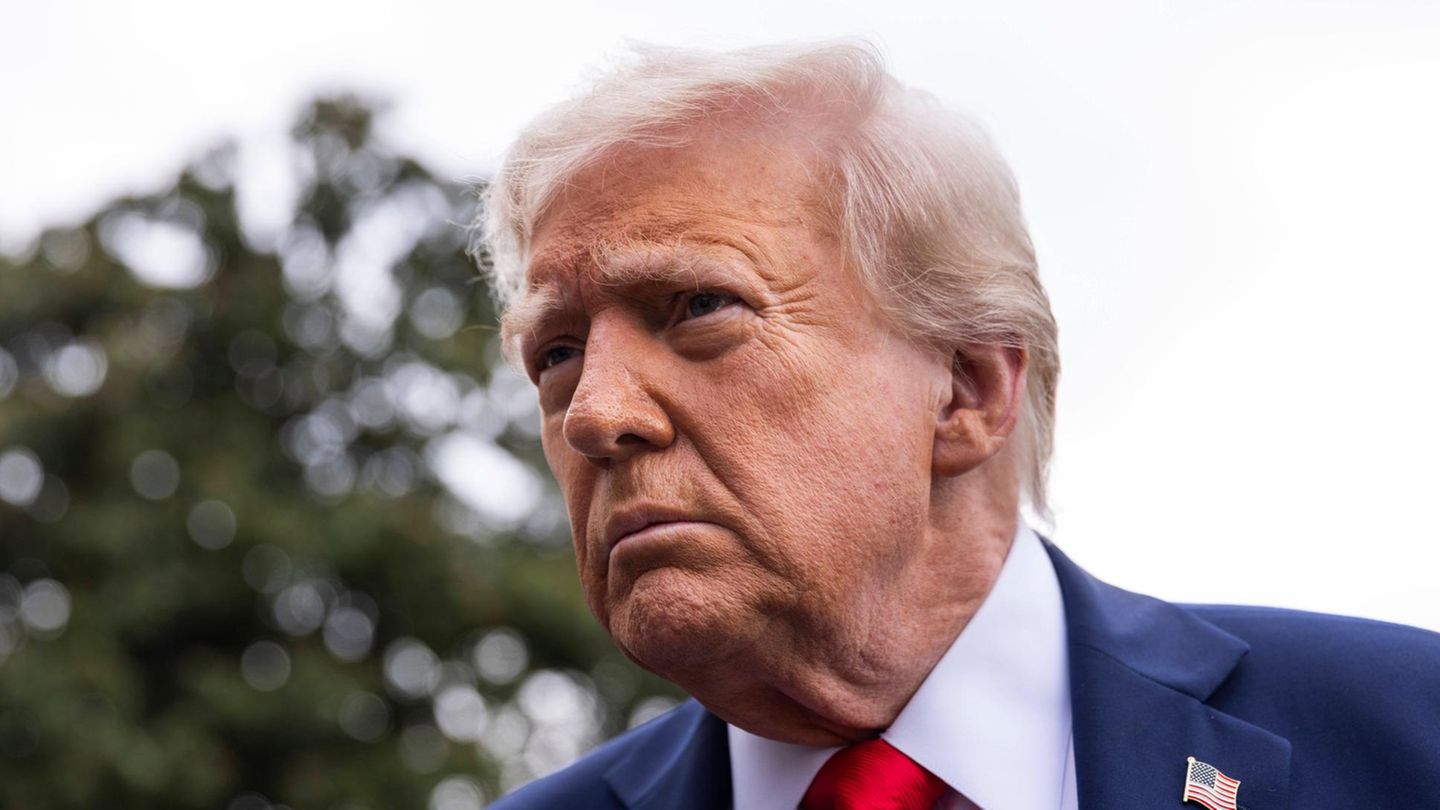
Lesezeit

Die Trump-Regierung erhöht den Druck auf die Medien, nun schränkt sie die Berichterstattung über das Militär ein. Die Sorge um die amerikanische Demokratie wächst.
Die US-Regierung von Präsident Donald Trump schränkt die Berichterstattung über das Militär ein und verlangt von Medien, keine Informationen ohne vorherige Genehmigung zu veröffentlichen. Journalisten, die ohne Genehmigung Informationen veröffentlichen, droht der Entzug ihrer Akkreditierung, wie aus einem am Freitag veröffentlichten Memorandum des Verteidigungsministeriums hervorgeht. Ein Entzug der Akkreditierung würde den Zugang zu allen US-Militäreinrichtungen, einschließlich des Pentagons, verwehren.
Führende Medienorganisationen verurteilten den Schritt umgehend. Die Nachrichtenagentur Reuters zeigte sich “zutiefst besorgt”. Eine freie und unabhängige Presse sei für die amerikanische Demokratie unerlässlich, um Transparenz und Rechenschaftspflicht zu gewährleisten, hieß es in einer Stellungnahme. Jeder Versuch der Regierung, die Berichterstattung einzuschränken, untergrabe den Schutz des Ersten Verfassungszusatzes. Reuters werde weiterhin “unparteiisch, genau und unabhängig” über das Pentagon berichten. Auch die “New York Times”, die “Washington Post” und das “Wall Street Journal” kritisierten die Maßnahme. Der Nationale Presseclub in Washington sprach von einem “direkten Angriff” auf den unabhängigen Journalismus.
Auch aus der eigenen Partei kam Kritik. Der republikanische Abgeordnete Don Bacon, ein Veteran der Luftwaffe, kritisierte die Einschränkungen. “Eine freie Presse macht unser Land besser”, schrieb er auf der Plattform X. “Das klingt nach mehr Stümperei.” Ein Sprecher des Pentagon, Sean Parnell, verteidigte die neuen Regeln hingegen. Es handele sich um “grundlegende, sinnvolle Richtlinien zum Schutz sensibler Informationen sowie der nationalen Sicherheit”, erklärte er. Präsident Trump selbst äußerte sich am Sonntag ausweichend. Auf die Frage, ob das Pentagon bestimmen solle, worüber die Presse berichte, antwortete er: “Nein, das glaube ich nicht. Reporter sind nicht aufzuhalten.”
Der Schritt ist der jüngste in einer Reihe von Maßnahmen der Trump-Regierung, mit denen der Druck auf Medienorganisationen erhöht wird. Er bedeutet zudem eine Ausweitung der Beschränkungen unter Verteidigungsminister Pete Hegseth, einem ehemaligen Moderator des Senders Fox News. Im Februar hatte das Ministerium vier Medienorganisationen aus ihren Büros im Pentagon verwiesen und eine Rotation mit anderen, auch rechtsgerichteten, Publikationen begonnen. Im Mai ordnete Hegseth an, dass Journalisten in weiten Teilen des Gebäudes von offiziellen Begleitern eskortiert werden müssen. In dem Memorandum wird das Ministerium als “Department of War” (Kriegsministerium) bezeichnet. Trump hatte eine entsprechende Umbenennung angeordnet, die jedoch vom Kongress beschlossen werden muss.
Reuters


Lesezeit

Fri 20th Dec, 2024
On December 20, 1999, Portugal officially relinquished control of Macau, a former colony that had been under its governance for more than 400 years. This transition marked a significant shift in the region’s political and economic landscape, transforming Macau into a prominent gambling hub often referred to as the ‘Las Vegas of Asia.’
Unlike Hong Kong, which experienced significant political unrest following its handover to China, Macau has largely maintained political stability. The region, which is significantly smaller in both area and population compared to its neighbor, has become an appealing destination for tourists, primarily due to its extensive gaming industry.
Macau is characterized by its Cotai Strip, a bustling boulevard akin to Las Vegas, where visitors find a plethora of casinos, luxury hotels, and shopping centers. Numerous major companies have established themselves in Macau, drawing inspiration from the iconic resorts of Nevada. This strategic positioning has solidified Macau’s reputation as a leading entertainment destination in Asia.
Historically, Macau’s connection to China deepened long before the 1999 handover. The influence of Chinese culture and politics has been significant, particularly during the Cultural Revolution, which began in 1966. By the time of the handover, the governance of Macau had already shifted largely towards Chinese influence, leading to a unique political landscape that has not seen the same level of protest as Hong Kong.
In the years following the handover, Macau’s economy has thrived, especially after the liberalization of its gaming industry. The introduction of competitive gaming licenses attracted international operators, particularly from the United States, who have significantly contributed to the local economy. As a result, Macau’s GDP has seen remarkable growth, reaching approximately $70,000 per capita by 2023, which surpasses that of Hong Kong and mainland China.
Despite its economic success, the dependency on tourism and gambling raises concerns about sustainability. The local government has recognized this challenge and has been distributing a portion of its budget surplus to residents, ensuring that the population benefits from the economic boom.
Macau’s cultural identity remains complex, with nearly half of its residents originating from mainland China. This demographic composition has influenced local sentiment towards governance and the broader relationship with China. As political changes continue to unfold in the region, Macau has been praised as a model for the ‘One Country, Two Systems’ principle, illustrating a different trajectory from Hong Kong.
As the 25th anniversary of the handover approaches, the question of Macau’s future remains pertinent. While the region continues to flourish as a gambling and entertainment hub, the potential for greater integration with mainland China looms, prompting discussions about the long-term implications for its autonomous status and cultural identity.
In conclusion, Macau’s evolution from a colonial outpost to a vibrant economic center reflects broader trends in regional politics and economics. As it celebrates a quarter-century since its return to Chinese sovereignty, Macau stands as a testament to the complexities of post-colonial governance in the context of a rapidly changing global landscape.

With statutory health insurance contributions set to increase in January 2026, we look at how the proposed increases could affect your wallet – and what steps you can take to keep the financial impact to a minimum.


Legal Initiatives Intensify Around Abortion Pill Access


Allergie- & Immunologietage | Düsseldorf Congress


30 Tage Bikini Workout | Women’s Best Blog


8 Übungen gegen Cellulite | Women’s Best Blog


Cellulite loswerden? Das hilft! | Women’s Best Blog


BRUIT≤ – The Age of Ephemerality


Me Made Mittwoch mit neuen Regeln am 02. Juli 2025


In diesem Blogartikel findest du eine hilfreiche ➤ CHECKLISTE mit ✔ 5 TIPPS, um deine ✔ Zeit besser einzuteilen & deine ✔ Fitness-Ziele zu erreichen! ➤ Jetzt lesen!